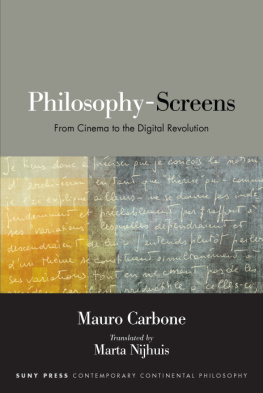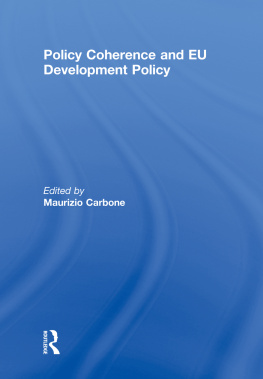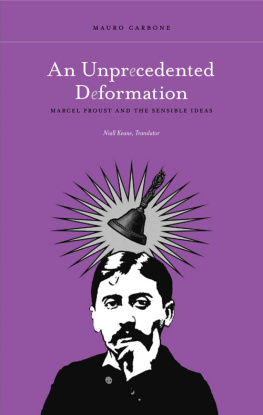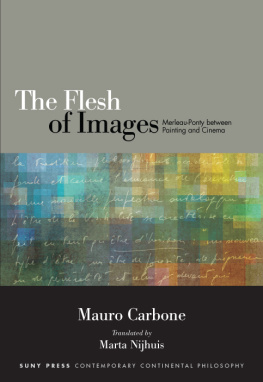Mauro Carbone - Philosophy-Screens
Here you can read online Mauro Carbone - Philosophy-Screens full text of the book (entire story) in english for free. Download pdf and epub, get meaning, cover and reviews about this ebook. year: 2019, publisher: State University of New York Press, genre: Romance novel. Description of the work, (preface) as well as reviews are available. Best literature library LitArk.com created for fans of good reading and offers a wide selection of genres:
Romance novel
Science fiction
Adventure
Detective
Science
History
Home and family
Prose
Art
Politics
Computer
Non-fiction
Religion
Business
Children
Humor
Choose a favorite category and find really read worthwhile books. Enjoy immersion in the world of imagination, feel the emotions of the characters or learn something new for yourself, make an fascinating discovery.
- Book:Philosophy-Screens
- Author:
- Publisher:State University of New York Press
- Genre:
- Year:2019
- Rating:4 / 5
- Favourites:Add to favourites
- Your mark:
- 80
- 1
- 2
- 3
- 4
- 5
Philosophy-Screens: summary, description and annotation
We offer to read an annotation, description, summary or preface (depends on what the author of the book "Philosophy-Screens" wrote himself). If you haven't found the necessary information about the book — write in the comments, we will try to find it.
Philosophy-Screens — read online for free the complete book (whole text) full work
Below is the text of the book, divided by pages. System saving the place of the last page read, allows you to conveniently read the book "Philosophy-Screens" online for free, without having to search again every time where you left off. Put a bookmark, and you can go to the page where you finished reading at any time.
Font size:
Interval:
Bookmark:

Philosophy-Screens
SUNY series in Contemporary Continental Philosophy
Dennis J. Schmidt, editor
Philosophy-Screens
From Cinema to the Digital Revolution
Mauro Carbone
Translated by
Marta Nijhuis

Published by State University of New York Press, Albany
Philosophie-crans. Du cinma la rvolution numrique
Librairie Philosophique J. VRIN, Paris, 2016.
http://www.vrin.fr
2019 State University of New York
All rights reserved
Printed in the United States of America
No part of this book may be used or reproduced in any manner whatsoever without written permission. No part of this book may be stored in a retrieval system or transmitted in any form or by any means including electronic, electrostatic, magnetic tape, mechanical, photocopying, recording, or otherwise without the prior permission in writing of the publisher.
For information, contact State University of New York Press, Albany, NY
www.sunypress.edu
Library of Congress Cataloging-in-Publication Data
Names: Carbone, Mauro, 1956 author. | Nijhuis, Marta, 1983 translator.
Title: Philosophy-screens : from cinema to the digital revolution / Mauro Carbone ; translated by Marta Nijhuis.
Other titles: Philosophie-crans. English
Description: Albany : State University of New York Press, [2019] | Series: SUNY series in contemporary continental philosophy | Includes bibliographical references and index.
Identifiers: LCCN 2018033266 | ISBN 9781438474656 (hardcover : alk. paper) | ISBN 9781438474663 (ebook)
Subjects: LCSH: Motion picturesPhilosophy. | Philosophy, Modern20th century.
Classification: LCC PN1995 .C341313 2019 | DDC 791.4301dc23
LC record available at https://lccn.loc.gov/2018033266
10 9 8 7 6 5 4 3 2 1
P ART O NE
W HAT I S A P HILOSOPHY -C INEMA ?
Chapter One
Sartre and Deleuze via Bergson
Chapter Two
The Philosopher and the Moviemaker: Merleau-Ponty and the Meaning of Cinema
Chapter Three
The Torn Curtain: Lyotard, the Screen, and a Cinema Named Desire
P ART T WO
T HE A NIMATED L IFE of S CREENS
Chapter Four
Delimiting to Exceed: The Theme of the Arche-Screen Founding Itself with Its Variants
Chapter Five
Come Live with Me: The Seduction of the Screens Today
Chapter Six
Making Philosophy among and through the Screens
There is no need to recall the Allegory of the Cave: philosophy always made its distaste for screens quite clear, regardless of the kind. One could even claim that philosophy traditionally identified itselfi.e., found its very identity in a fight against the screens, which it assimilated with the illusion, the deceit, the obstacle preventing from the contemplation of truth. Indeed, it is precisely under this sign that philosophys relation to the cinema began. In 1907, nearly twelve years after the birth of the cinematograph, Henri Bergson stated, in Creative Evolution , that this technology rendered but a pure illusion of movement.
Still, if only one looks deeper, things are not quite as simple. Rather, they are ambiguouseven literally ambiguous, that is to say, such as to present two possible meanings. In fact, what Plato describes in the Allegory of the Cave is not a single screen, but precisely two : one showing, the other one concealing; both converging, however, in their global effect, as the two complementary possibilities of one single configuration . In the following pages, I shall call such a configuration the arche-screen .
The ambiguity of this configuration makes us understand that philosophys relations to the screens have, in turn, always been ambiguous. Actually, as I suggested before, on the one hand, philosophy has always accused the screens of not making us see what it is decisive to know. Still, on the other hand, philosophy invariably ended up looking for some sort of screen, precisely to make us see , through them, at least the image of what it wants us to know. The Bergsonian condemnation of the cinematograph may just as well exemplify the first side of such an ambiguous relationship, while the metaphor of the black screen that Bergson himself posits in Matter and Memory , as well as the attempts of twentieth-century French philosophy to rehabilitate the cinema and its screenwhich I will take into account in the initial part of the bookrather refer to the other side. Indeed, this latter side suggests that (and why) philosophy has always hadgenerally in an implicit and (too) often unavowed wayits own specific need for screens . The reasons for such an exigency do not seem too different from the ones concerning our very vision, which is itself marked by a constitutive screens necessity, since it is the visual perception of a figure on a ground, that is to say, precisely a screen.
However, what happens when considering that the screens have a long and diverse cultural history? What happens when considering that such a history has been sedimenting in that of the very term defining them and of others that have gradually matched it in order to specify the function that the screens would provide? What happens when considering that such a history has also been sedimenting in certain metaphors through which we have tried to find figures that could give a fundament to our ways to conceive the screens themselves? And moreover, what happens when considering that those screens, as announced in the title of this books second part, keep living an animated life, namely, a life that animates ours all the more? Eventually, what happens when considering that our screens experience has crossed deep mutations and does not cease to report new ones, which cannot but influence and hence modify our ways of perceiving, desiring, knowing, and thinking? Such are questions that the philosophical reflection can no longer elude, not only as they strongly demand to be interrogated, but also as they interrogate it in turn. Let us hence go back to the beginning: What happens if the mutations that I just recalled no longer allow to continue to expect that philosophy identifies itself with the fight against the screens? Gilles Deleuze had raised a similar question when referring to the inescapable novelty of the advent of the cinema, which consequently demanded the elaboration of what he once called a philosophy-cinema. The choice to echo, in the title of this book, such an amazing formulationunexplored by Deleuze himself in the first placeaims at reviving the radicalness of the need it expresses, by trying to qualify, detail, and see it in a new lightthe light of our screens.
The starting points for this book are the research cores of my previous works The Flesh of Images: Merleau-Ponty Between Painting and Cinema (2015, originally published in French in 2011) and tre morts ensemble: lvnement du 11 septembre 2001 (2013), whose last chapter I have developed and updated in the article Falling Man: The Time of Trauma, the Time of (Certain) Images.
I had the chance to develop and enhance such research cores thanks to the extraordinary opportunity I was given by being appointed Senior Member of the Institut Universitaire de France , which was crucial in providing me with the conditions to continue my researches. In fact, membership in such a prestigious French institution allowed me to establish and consolidate scientific contacts that were decisively beneficial to the preparation of the present book. My warmest thanks are hence addressed, first of all, to the Institut Universitaire de France as well as to the colleagues who supported my candidacy, namely, Renaud Barbaras and Vivian Sobchack. Also, I would like to thank from the bottom of my heart, for a continuous and friendly exchange that was both public and private, Emmanuel Alloa, Gabriela Basterra, Giovanna Borradori, Francesco Casetti, Michele Cometa, Jean-Pierre Esquenazi, Vittorio Gallese, Richard Grusin, Galen Johnson, W. J. T. Mitchell, Pietro Montani, Andrea Pinotti, Pierre Rodrigo, Emmanuel de Saint Aubert, Antonio Somaini, Bernard Stiegler, Luc Vancheri. For including me in the precious discussions that allowed me to submit the reflections I was elaborating for this book to the remarks of students and specialists from very different nations and domains, I am extremely grateful to Arthur Cools, Roberto De Gaetano, lie During, Ericson Falabretti, Arild Fetveit, Amy Foley, Jean-Baptiste Joinet, Rajiv Kaushik, Jos Manuel Martins, Marcos Jos Mller, Peter Reynaert, Jim Risser, Alejandro Vallega, Daniela Vallega-Neu. In turn, Dudley Andrew, Tom Gunning, Masaki Kondo, and Erica Nijhuis, by virtue of their competences and insight, gave me very important suggestions, confirmations, and critical remarks for which I am truly thankful.
Font size:
Interval:
Bookmark:
Similar books «Philosophy-Screens»
Look at similar books to Philosophy-Screens. We have selected literature similar in name and meaning in the hope of providing readers with more options to find new, interesting, not yet read works.
Discussion, reviews of the book Philosophy-Screens and just readers' own opinions. Leave your comments, write what you think about the work, its meaning or the main characters. Specify what exactly you liked and what you didn't like, and why you think so.













